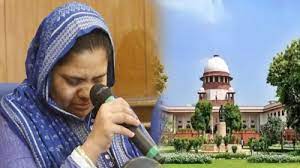A questionable refusal: On the rejection of Bilkis Bano’s review plea
The Supreme Court of India should have reviewed its order letting Gujarat decide on remission for Bilkis case convicts
It is a matter of concern that the Supreme Court has declined to review its May 2022 order holding that the Gujarat government is the “appropriate government” to decide on the premature release of 11 convicts serving life terms in the Bilkis Bano gang-rape case, which also involved the gruesome murder of several others. A court’s jurisdiction to review its own order is limited to correcting any error apparent on the face of the record. It is also a discretionary remedy and generally not heard in open court. However, it appears that the two-Judge Bench has failed to address a significant error in its finding that the decision on remission should be made by the Gujarat government. The case, which arose from one of the many heinous crimes that took place during the 2002 anti-Muslim pogrom in Gujarat, had been transferred for trial to Mumbai by the Court. The appeal arising from it was heard by the Bombay High Court. Section 432(7) of the Code of Criminal Procedure (CrPC) says the “appropriate government” is “the Government of the State within which the offender is sentenced”. Despite this clear provision, the Bench had taken the view that as the offence had taken place in Gujarat, and the trial in Mumbai, further matters had returned to the jurisdiction of Gujarat on conclusion of trial. It had also noted that the transfer of the trial to another State had taken place under “extraordinary circumstances”.
The Bench’s view was quite peculiar because it goes against a statutory provision. Also, the transfer took place only because a fair trial was not possible in Gujarat. It stands to reason that the Gujarat government ought to have been divested of the power to consider remission in the same case. Another aspect of the earlier order was that it had specified that the remission should be considered under its 1992 policy, as it was the one in force on the day of their conviction. Accordingly, in the absence of any specific curbs in that policy on the power to remit the sentences of those involved in heinous crimes, the convicts were released. The Centre, it was later revealed, had also concurred with the decision. Fortunately, the refusal to review the earlier order will not affect the outcome of a separate petition challenging their release. There seem to be enough grounds to question the remission. Court filings suggest that the trial judge’s opinion against their release was disregarded. Further, the presence of political functionaries, including BJP MLAs, on a committee that recommended their release, may have also vitiated the decision. The Supreme Court may still have an opportunity to examine the legitimacy of allowing the premature release of those directly involved in communally motivated crimes.
